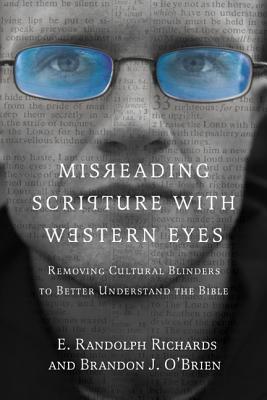
All of us assume things that “go without saying”. And, until we encounter other cultures, we tend to assume that the things that go without saying are universally true. Furthermore, we are not aware of these assumptions ordinarily. We don’t see them, we see “through” them.
In Misreading Scripture with Western Eyes: Removing Cultural Blinders to Better Understand the Bible (InterVarsity Press, 2013), E. Randolph Richards and Brandon J. O’Brien take these insights and apply them to how we read the Bible, a collection of books situated in different times and cultures (as well as a transcendent perspective!). They draw on their own cross-cultural missions experience to provide numerous helpful examples of how they discovered their own “western eyes”. As matters that lie “above the surface”, the authors explore mores, especially around sex, food, and money, race and ethnicity (particularly the presence of these issues in biblical narrative–for example, the book of Ruth, and our use of language. Below the surface come matters of individualism versus collectivism (we read the Bible very individualistically–much of the world does not), honor and shame versus right and wrong (western culture emphasizes the latter), and our conceptions of time (chronos vs kairos). And deep below the surface, they see issues of rules and relationships (which comes first), virtue and vice, and how we understand the will of God (all about me vs God’s will for the world and his people).
They conclude each chapter with questions to help internalize the content and conclude the book with some beginning steps to recognize our cultural blinders. They also include an extensive listing organized around the book’s chapters of resources for further study.
In reading this book, I find myself still wrestling with the desire for a protocol for reaching the ‘right’ interpretation of the biblical text, which I realize reflects my western embrace of right vs. wrong categories as well as my individualism. What this book helpfully does for me is remind me of the lenses I use in reading scripture as well as my need to read and understand the scriptures in a community that includes those who read with different lenses as well as being reminded of the different cultural horizon of the text. And that reminder also renews in me the sense of how we need the illumination of the Spirit to see more clearly.
Bob Trube is Associate Director of Faculty Ministry and Director of the Emerging Scholars Network. He blogs on books regularly at bobonbooks.com. He resides in Columbus, Ohio, with Marilyn and enjoys reading, gardening, choral singing, and plein air painting.

Leave a Reply